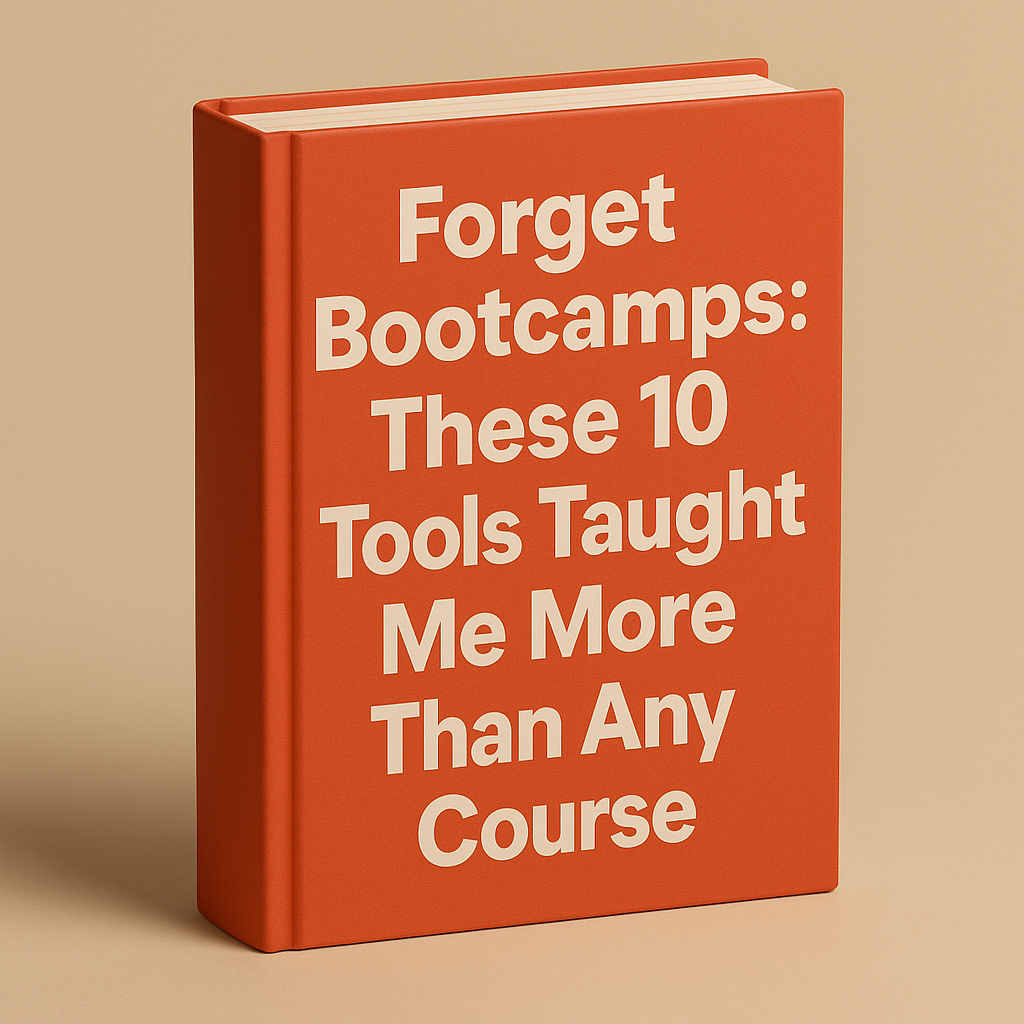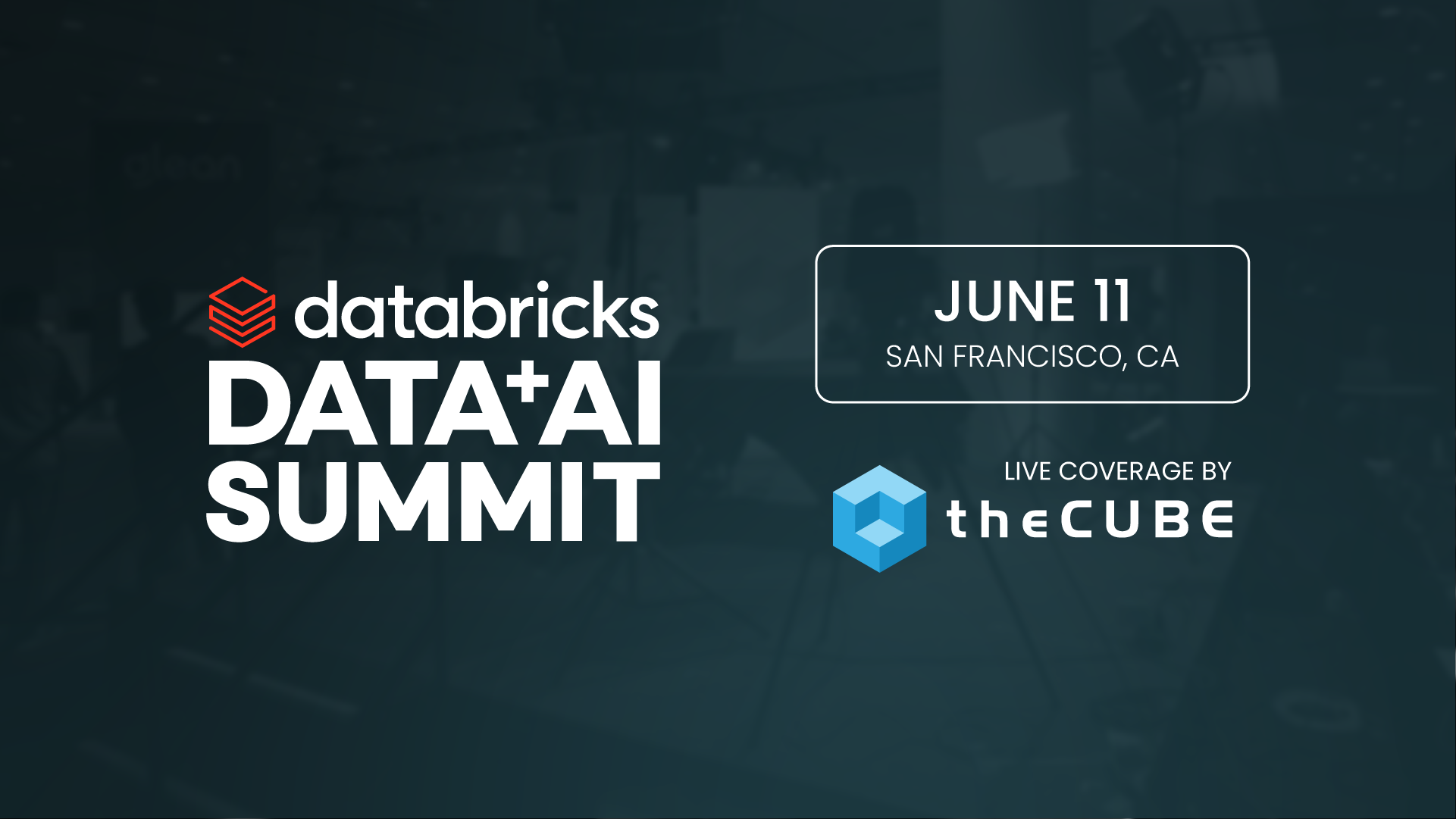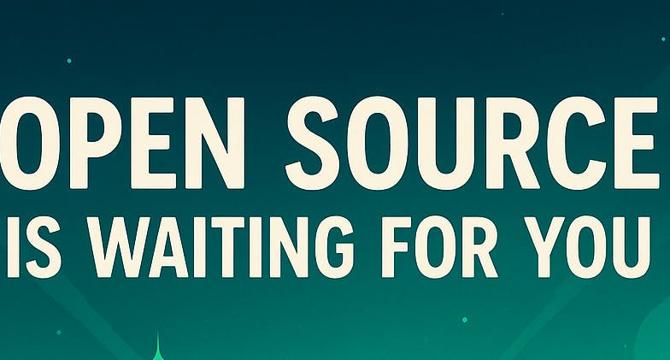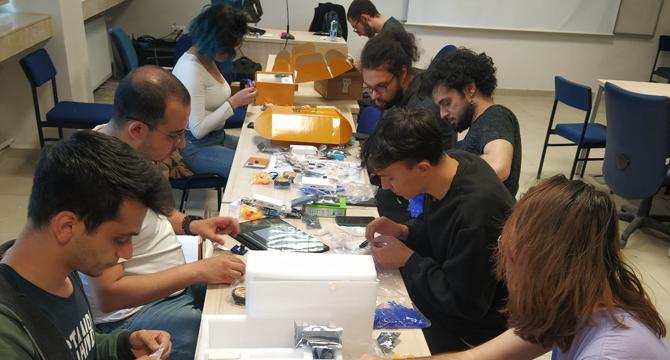Open Source News
Medium
274

Image Credit: Medium
Forget Bootcamps: These 10 Tools Taught Me More Than Any Course
- Developers often have a personal connection with the tools they use, which shape their craft over time.
- A developer shares 10 open-source tools that have significantly impacted the way they approach development.
- The list includes tools that have not only saved time but also changed the developer's perspective on building applications.
- The tools mentioned are based on the author's personal experience and have earned a place in their long-term toolkit.
Read Full Article
16 Likes
Marktechpost
407

Google Introduces Open-Source Full-Stack AI Agent Stack Using Gemini 2.5 and LangGraph for Multi-Step Web Search, Reflection, and Synthesis
- Google has introduced an open-source full-stack AI agent stack combining Gemini 2.5 and LangGraph for multi-step web search, reflection, and synthesis.
- The project addresses the limitations of existing large language models by enabling autonomous web searches, validation of results, and response refinement mimicking human research assistants.
- The architecture includes a React frontend and a FastAPI + LangGraph backend, allowing for dynamic information synthesis and iterative search cycles.
- The system emphasizes autonomous reasoning, delayed response synthesis, and source citations, making it suitable for research, knowledge bases, technical support bots, and consulting tools.
Read Full Article
24 Likes
Medium
385

Introducing Liven Beta: A Context Engine for Codebase Dependency Mapping
- Liven Beta is a Context Engine that builds a comprehensive dependency architecture of a codebase, connecting classes, functions, and relationships across files and folders.
- The tool aims to help LLMs and humans better understand codebase components' interactions for faster analysis, smarter code generation, and effective debugging.
- In its initial beta version, Liven assists in breaking down complexity and showcasing the code architecture for developers working on monorepos or microservices.
- BytQuest invites feedback, thoughts, and feature ideas for Liven Beta and the upcoming launch of Tross. Developers can explore the code, open issues, send PRs, and join the Discord community for updates.
Read Full Article
23 Likes
Siliconangle
67

Image Credit: Siliconangle
What to expect during Databricks’ Data + AI Summit: Join theCUBE on June 11
- Unified data strategies are crucial for the success of artificial intelligence in enterprises, with companies like Databricks recognizing the need for unified data systems to support AI demands.
- Databricks aims to evolve Unity Catalog into a true business control plane and bridge the gap between agent development and enterprise execution with Mosaic AI.
- The Data + AI Summit by Databricks will delve into accelerating enterprise adoption of AI through unified data architectures, open-source innovation, and lakehouse platforms.
- The event will feature discussions on how unified data platforms, particularly those built on lakehouse architectures, are facilitating intelligent actions from raw data.
- Enterprises are experimenting with large language models in sandboxed environments to enhance AI-assisted workflows and improve information retrieval systems.
- The real challenge lies in the metadata layer, with Unity Catalog striving for enhancements to compete with Informatica as part of Salesforce.
- Databricks executives and industry experts will discuss the latest use cases and product announcements at the Data + AI Summit on June 11.
- theCUBE will provide live coverage and insights into the evolution of unified data platforms and Databricks' innovations during the event.
- Various ways to watch the event coverage include theCUBE's website, YouTube channel, and podcasts available on iTunes, Stitcher, and Spotify.
- Prominent Databricks executives, including Jonathan Frankle and Steve Sobel, will be interviewed during the summit to discuss advancements in generative and agentic AI.
- TheCUBE is a paid media partner for the Databricks Data + AI Summit, ensuring free and relevant content with editorial independence.
Read Full Article
4 Likes
Discover more
- Programming News
- Software News
- Web Design
- Devops News
- Databases
- Cloud News
- Product Management News
- Operating Systems News
- Agile Methodology News
- Computer Engineering
- Startup News
- Cryptocurrency News
- Technology News
- Blockchain News
- Data Science News
- AR News
- Apple News
- Cyber Security News
- Leadership News
- Gaming News
- Automobiles News
Silicon
309
Image Credit: Silicon
Beyond Code: The Leadership Imperative in the Age of AI
- Chinese AI platforms like DeepSeek and Manus AI have redefined what foundational models can do, challenging Western dominance.
- AI is reshaping business operating models and strategic logic, fueling creativity and capability with new architectures like Mixture-of-Experts.
- AI won't replace jobs, but those who understand how to lead in an AI-powered world will succeed.
- Leadership means making decisions rooted in experience, empathy, and vision, where human judgment excels over machine precision.
- Business leaders need to embrace shifts such as transitioning from operators to leaders and focusing on clarity and curation.
- Creativity and culture are evolving in the AI era, where originality and human skills like empathy set individuals apart.
- Leadership involves knowing when to break from data-driven decisions and take bold risks for transformation.
- Culture, autonomy, and trust are integral to successful organizations in the AI era, driving innovation and growth.
- AI can't replicate human ability to build team cultures, inspire creativity, or make strategic decisions beyond statistical likelihood.
- Leadership's strength lies in asking better questions, interpreting ambiguity, and making decisions where AI falls short.
Read Full Article
18 Likes
Marktechpost
435

Alibaba Qwen Team Releases Qwen3-Embedding and Qwen3-Reranker Series – Redefining Multilingual Embedding and Ranking Standards
- Alibaba's Qwen Team introduces Qwen3-Embedding and Qwen3-Reranker Series to redefine multilingual text embedding and ranking standards.
- Qwen3 models offer high multilingual fidelity and task adaptability, being open-sourced under the Apache 2.0 license and accessible via Alibaba Cloud APIs.
- The technical architecture includes dense transformer-based models with causal attention, trained through large-scale weak supervision and supervised fine-tuning, showcasing strong empirical performance across benchmarks.
- Qwen3-Embedding and Qwen3-Reranker series set new benchmarks in multilingual embeddings and relevance ranking, providing robust, open, and scalable solutions for applications like semantic retrieval, RAG, and sentiment analysis.
Read Full Article
26 Likes
Kaspersky
364

Image Credit: Kaspersky
Commercial vs. open-source SIEM: pros and cons | Kaspersky official blog
- Open-source solutions are commonly used in the IT market, including for building SIEM systems.
- Setting up a SIEM system using open-source tools like Logstash, Elasticsearch, and Kibana offers flexibility and cost savings.
- Building a custom OSS SIEM requires time, specialized skills, and ongoing support from a dedicated team.
- Implementing a self-built SIEM or OSS solution can significantly extend the time to deliver real value compared to ready-made solutions.
- Shortages in specialized skills for high-load system design and content creation can be a challenge for SIEM builders.
- Compliance efforts are more demanding for self-built SIEMs compared to commercial solutions with built-in certification processes.
- Vendor lock-in and employee dependence are key considerations when deciding between open-source and commercial SIEM solutions.
- Open-source SIEMs may offer simplicity in customization but can lead to higher long-term total cost of ownership due to maintenance expenses.
- Commercial SIEM solutions provide regular updates, threat intelligence feeds, and support, reducing the burden on in-house security teams.
- Choosing an open-source SIEM involves careful evaluation of hardware costs and architectural decisions that can impact operational expenses.
Read Full Article
21 Likes
Mjtsai
360

The iPhone 15 Pro’s Depth Maps
- Finn Jaeger, head of VFX at Replayboys, shared a screenshot displaying multiple depth maps produced by his iPhone for a project called HEIC Shenanigans.
- The project includes scripts to extract images and metadata from HEIC containers and convert them into EXR Files, currently comprising 374 lines of Python.
- iPhones use various methods, including LIDAR, to capture depth data for photos. Recent models capture depth maps not only for Portrait photos but also for standard photos.
Read Full Article
21 Likes
Bitcoinmagazine
423

BTCPay Server: The Backbone of Bitcoin Commerce, 2025
- BTCPay Server, a decentralized open-source cryptocurrency payment processor, originated from a developer's backlash against Bitpay's co-opting of Bitcoin.
- Founded by Nicolas Dorier, BTCPay Server offers features like invoicing, accounting, wallet capabilities, and modular plugins for various functionalities.
- The project serves as a privacy-focused and direct payment processing solution with no centralized database of users, benefiting merchants by saving fees and enhancing user experience.
- BTCPay Server has seen significant adoption, with over 170 contributors and one million downloads from its GitHub repository by 2025.
- The platform is extensively used worldwide, with instances running on various continents and serving multiple merchants simultaneously.
- Companies like Namecheap and BTC Inc have integrated BTCPay Server, showcasing substantial transaction volumes and revenue through Bitcoin payments.
- BTCPay Server's plugin system, with over 30 plugins available, includes integrations like Boltz Swap Exchange, Bolt Cards, Ghost blogging suite, Nostr Support, and more.
- The platform also supports tools like Satoshi Tickets for event ticket management, Prism for revenue splitting, Cash plugin for fiat payments, and Podserver for podcasters.
- Supported by organizations like Opensats and the Human Rights Foundation, BTCPay Server continues to evolve as a backbone of Bitcoin commerce in 2025.
- The platform's decentralized nature, emphasis on privacy, and wide range of functionalities position it as a crucial infrastructure for Bitcoin adoption and payment processing.
Read Full Article
25 Likes
Hackernoon
297

Image Credit: Hackernoon
Don’t Be Intimidated by Open Source—Here’s How to Start Helping
- The shortage of open source contributors is a reality, with only 17% of developers consistently active in contributing.
- Contributions beyond code, such as writing docs, triaging issues, and providing feedback, play a crucial role in supporting open source projects.
- Common blockers for developers contributing to open source include fear of judgment, low confidence, lack of guidance, language barriers, and time constraints.
- The lack of new contributors in open source can lead to project stagnation, maintainer burnout, and the loss of support for critical technologies.
- Encouraging more developers to contribute can unlock lost potential for innovation and ensure the sustainability of open source projects.
- Creating welcoming environments, improving documentation, offering beginner-friendly tasks, and providing constructive feedback are key to attracting and retaining contributors.
- Projects like Vue.js, p5.js, and OpenRefine exemplify good practices in engaging contributors and supporting a diverse community.
- Contributing to open source is not just about code but also about helping and mentoring others, fostering growth and collaboration within the community.
- Starting small and working together can make a significant impact in the open source world, allowing more individuals to participate and grow as developers.
- Engaging in open source doesn't require being a genius; it's about making a start and contributing in any way possible to support the growth of developers, communities, and ideas.
Read Full Article
17 Likes
VentureBeat
320

Image Credit: VentureBeat
Enterprise alert: PostgreSQL just became the database you can’t ignore for AI applications
- Snowflake is acquiring PostgreSQL provider Crunchy Data in a deal valued at $250 million, following Databricks' acquisition of serverless PostgreSQL vendor Neon.
- Crunchy Data, founded in 2012, has a core platform offering managed and supported versions of PostgreSQL for enterprise workloads, Kubernetes environments, and data lakehouse environments.
- Snowflake plans to create 'Snowflake Postgres' using Crunchy Data's technology to simplify the development and scaling of AI applications within Snowflake's data cloud platform.
- The growing popularity of PostgreSQL for enterprise and AI applications is evident through acquisitions by major companies like Snowflake and Databricks, highlighting its importance in modern data workflows.
Read Full Article
19 Likes
VentureBeat
94

Image Credit: VentureBeat
Google quietly launches AI Edge Gallery, letting Android phones run AI without the cloud
- Google has quietly launched the AI Edge Gallery, an experimental Android app that allows users to run AI models directly on their smartphones without internet connection.
- AI Edge Gallery enables tasks like image analysis, text generation, and coding assistance while ensuring data processing remains local.
- The app, available through GitHub, aims to democratize AI access and address privacy concerns related to cloud-based AI services.
- Built on Google’s LiteRT and MediaPipe frameworks, the app supports various machine learning frameworks and is optimized for mobile devices.
- The Gemma 3 model in the app offers efficient language processing and quick response times for tasks such as text generation and image analysis.
- AI Chat, Ask Image, and Prompt Lab are core capabilities of the app, allowing users to perform a variety of tasks offline.
- The on-device processing approach enhances data privacy and compliance with regulations, particularly in sensitive industries like healthcare and finance.
- However, the shift to on-device processing raises new security concerns, requiring organizations to focus on protecting devices and AI models.
- Google's platform approach with AI Edge Gallery differs from competitors, focusing on infrastructure rather than proprietary features.
- While the app faces limitations such as performance variations and installation complexities, it represents a significant shift in AI deployment towards edge computing and privacy-focused strategies.
Read Full Article
5 Likes
Nvidia
18

Image Credit: Nvidia
Researchers and Students in Türkiye Build AI, Robotics Tools to Boost Disaster Readiness
- In Türkiye, researchers, students, and developers are utilizing AI and robotics technologies to enhance disaster preparedness following a devastating earthquake two years ago.
- Supported by an initiative from NVIDIA and Bridge to Türkiye Fund, projects focus on AI-powered inspection, search and rescue operations, and robotics education.
- The Disaster Response Innovation and Education Grant provided resources like NVIDIA Jetson Nano Developer Kits and funding to aid in the development of various tools and courses.
- Projects include training robots for search and rescue tasks, creating tools for testing water and food contamination, and offering hands-on programming courses.
- An unmanned ground vehicle (UGV) equipped with advanced cameras and AI computing from NVIDIA aids in post-earthquake search and rescue operations at Ankara University.
- Students at Hacettepe University are learning robotics skills, including SLAM, using NVIDIA Jetson Nano Developer Kits to build robots for navigation in disaster environments.
- Bilkent University researchers developed a mini supercomputer cluster based on NVIDIA Jetson Nano kits for rapid pathogen screening in disaster zones, helping prevent disease outbreaks.
- At Izmir Institute of Technology, nearly 80 undergraduates are gaining AI and robotics knowledge through hands-on projects with NVIDIA Jetson Nano devices and CUDA technology.
- The initiative aims to increase expertise in AI and robotics, reduce casualties in future disasters, and provide practical solutions for post-disaster scenarios in Türkiye.
- Various academic institutions in Türkiye are actively leveraging NVIDIA's resources and educational support to build innovative, life-saving technologies.
Read Full Article
1 Like
Medium
85

How to achieve maximum digital privacy
- Mullvad Browser by Tor Project and Mullvad VPN offers maximum anonymity by resisting fingerprinting and disabling tracking scripts.
- Mojeek search engine operates its own index, does not track users, and provides impartial search results.
- Proton Drive for encrypted cloud file storage and CryptPad for secure real-time collaboration are recommended over Google Drive and Docs.
- Ente Photos encrypts and securely backs up photos, respecting user privacy, while Organic Maps based on OpenStreetMap provides offline navigation with location privacy.
- Invidious is a tracking-free front-end for YouTube, Notesnook is an offline and encrypted notes app, and F-Droid is a secure app store alternative to Play Store.
- FUTO Keyboard keeps typing data local, Proton Pass securely stores passwords, and Koel as a self-hosted music streaming server ensures privacy.
- Tuta Calendar integrates with Tuta Mail for encrypted scheduling, Calyx Meet is a privacy-focused video conferencing platform, and Signal is recommended for secure messaging.
- Using Kubuntu as a Linux distro and GrapheneOS as a secure mobile OS, along with the mentioned privacy-focused tools, can help maximize digital privacy.
Read Full Article
5 Likes
Medium
45

Image Credit: Medium
The Hidden Camera Crisis: How Smartphones Are Fighting Back
- Hidden cameras disguised in everyday objects pose a dangerous surveillance problem, often going undetected even by thorough visual inspections.
- Anti-surveillance tools have limitations against cameras that record locally without emitting signals or wireless activity.
- Smartphones offer a portable and affordable solution to detect hidden cameras, leveraging powerful cameras and sensors with specialized apps.
- Applications using infrared reflection detection and advanced glint analysis algorithms can highlight suspicious reflections, detecting hidden cameras.
- SpectreScan, an open-source mobile app, combines infrared reflection detection and LIDAR anomaly detection to enhance detection accuracy.
- The app is transparent, available on GitHub, and allows users to contribute to its development or build their privacy tools.
- SpectreScan empowers individuals to protect their privacy in short-term rentals and accommodations lacking oversight.
- As technology evolves, the conversion of smartphones into surveillance detection tools becomes essential for personal security.
- The battle for privacy emphasizes that personal security should be a basic right, achievable through accessible detection technology.
- Having a reliable way to detect hidden surveillance empowers individuals against privacy invasion in various settings.
Read Full Article
2 Likes
For uninterrupted reading, download the app